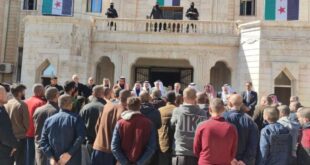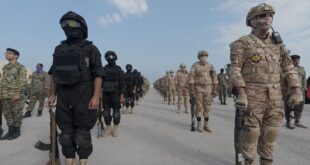BAGHDAD (AFP) — Thirteen US troops died in Iraq over the weekend including four killed when a military helicopter made an “emergency landing” in the restive west of the country, the US military said Monday.
The mounting US death toll came as US President George W. Bush, whose administration is under mounting pressure to find a way out of the conflict, prepared to hold White House talks with a powerful Iraqi Shiite leader.
The military said the pilots of the Marine Corps’ Sea Knight helicopter with 16 people on board made an emergency landing Sunday in Lake Qadisiyah in the mainly Sunni Arab province of Anbar.
“The incident does not appear to be a result of enemy action and is currently under investigation,” a statement said.
Twelve people survived the landing while one Marine was pulled out of the water but could not be revived.
The bodies of three other service members were recovered on Monday.
The CH-46 Sea Knight entered service in the early 1960s and is one of the oldest models in use with the US military. The entire 218-strong fleet was briefly taken out of service in 2002 after faults were found.
The US military death toll in Iraq — which dipped last month after a high in October during the Holy Month of Ramadan — has climbed back since the start of December.
Fatalities announced on Monday brought to 2,898 the number of US military losses since the US-led invasion in March 2003 to topple Saddam Hussein, according to an AFP count based on Pentagon figures.
Later Monday, Bush was expected to hold talks with Iraqi Shiite leader Abdel Aziz Hakim on the situation in a country which UN Secretary General Kofi Annan said is embroiled in bloodshed worse than a civil war.
Nearly 150 Iraqis have died over the past two days alone in sectarian and insurgent attacks.
“When we had the strife in Lebanon and other places, we called that a civil war — this is much worse,” Annan told the BBC.
Daily attacks across Iraq and primarily in Baghdad continue to drive a deep wedge between the warring Shiite and Sunni communities, and the sectarian bloodletting is expected to come up when Hakim meets Bush.
On Monday police recovered 52 corpses from Baghdad of men killed execution-style in apparent sectarian attacks, a security official said.
In his initial talks in Washington, Hakim urged senior US officials not to withdraw their troops from Iraq but to transfer more military authority to the government in Baghdad.
He told reporters he had “frank and transparent” talks with Secretary of State Condoleezza Rice on the future US role in Iraq.
Iraq’s government “asked for American forces to remain in Iraq while transferring more authority to Iraqi officials and forces to enable them to deal with terrorism”, he said.
Hakim, who heads the pro-Iranian Supreme Council of Islamic Revolution in Iraq (SCIRI), a powerful Shiite party in the ruling coalition, is a key figure in post-Saddam Iraq.
He does not hold a post in the current government but wields enormous influence due to SCIRI’s dominant role in Iraq’s police forces and to the power of the organisation’s armed group, the Badr Brigade.
Bush and Hakim are expected to discuss how to rein in the brigade and other Shiite factions that are allegedly involved in sectarian killings of Sunni Arabs and under the influence of Tehran.
US envoy in Iraq Zalmay Khalilzad and General George Casey, head of the coalition forces, in a joint statement urged Iraqis to restrain from indulging in communal bloodletting.
“We implore all Iraqis not to become pawns of those who seek to destroy you and your country. Do not allow yourself to be drawn down the road of senseless brutality by striking back,” the two top US officials in Iraq said.
Hakim’s visit comes as the Bush administration is re-evaluating its strategy in Iraq in the wake of the November 7 legislative elections, in which Republicans lost control of Congress to Democrats.
The debate was fuelled Sunday by a leaked memo, written last month by outgoing US Defence Secretary Donald Rumsfeld, in which he argued that the US strategy needed “a major adjustment”.
Rumsfeld called for a massive redeployment of US forces away from combat zones, speeded-up training of Iraqi security forces and buying support from Iraqi warlords with US cash.
In violence on Monday, eight people were killed.
 Eurasia Press & News
Eurasia Press & News



